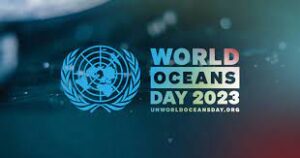World Oceans Day
Celebrating the Beauty and Importance of our Blue Planet
World Oceans Day, observed annually on June 8th, is a global celebration that aims to raise awareness about the significance of our oceans and promote actions to protect and conserve them. This article explores the importance of World Oceans Day, its history, key themes, and the urgent need to safeguard our marine ecosystems for a sustainable future.
Understanding the Significance of World Oceans Day
World Oceans Day was officially recognized by the United Nations in 2008 to emphasize the critical role oceans play in our lives. Oceans cover more than 70% of the Earth’s surface and are vital for regulating climate, supporting marine life, providing food and resources, and generating oxygen. World Oceans Day serves as a reminder of the profound impact oceans have on our planet and the necessity to preserve them for future generations.
History and Evolution of World Oceans Day
The concept of World Oceans Day originated in 1992 at the Earth Summit in Rio de Janeiro, Brazil. It was proposed by Canada’s International Centre for Ocean Development (ICOD) and the Ocean Institute of Canada (OIC) to raise global awareness about the importance of oceans. The United Nations officially recognized and designated June 8th as World Oceans Day in 2008, marking a significant milestone in global efforts to protect our oceans.
Key Themes and Messages
Each year, World Oceans Day focuses on a specific theme that addresses pressing ocean-related issues. These themes aim to engage people, organizations, and governments in meaningful discussions and actions. Some notable themes from recent years include:
-
“Planet Ocean: Tides are Changing” 2023 . This year’s theme indicates that change is happening around the world for ocean
preservation. World Ocean Day 2023 theme also aims to highlight the role of the ocean in helping sustain life on Earth
“Planet Ocean: Tides are Changing” 2023 - “Healthy Oceans, Healthy Planet” (2021): Emphasizing the interconnection between the health of oceans and the well-being of the planet.
- “Gender and Oceans” (2020): Highlighting the importance of gender equality and women’s empowerment in ocean conservation and sustainable development.
- “Our Oceans, Our Future” (2017): Inspiring individuals and communities to take responsibility for protecting oceans and encouraging sustainable practices.
Importance of Ocean Conservation
Biodiversity and Ecosystems
- Oceans harbor a vast array of marine species, many of which are still undiscovered. Preserving biodiversity is crucial for
maintaining the health and balance of marine ecosystems. - Coral reefs, seagrass beds, and mangrove forests provide habitat, protect coastlines, and support numerous species.
Conservation efforts are necessary to protect and restore these valuable ecosystems.
Climate Regulation
- Oceans absorb and store vast amounts of carbon dioxide, playing a significant role in regulating climate by mitigating
the impacts of greenhouse gas emissions. - The ocean’s thermohaline circulation helps distribute heat around the globe, influencing weather patterns and climate systems.
Food Security and Livelihoods
- Over 3 billion people depend on marine resources for their primary source of protein. Sustainable fishing practices and
responsible resource management are essential to ensure food security and support coastal communities.
Economic Benefits
- Oceans contribute to global economies through industries such as tourism, shipping, fisheries, and offshore energy
production. Sustainable practices safeguard these economic benefits for future generations.
Promoting Ocean Conservation and Sustainable Actions
World Oceans Day encourages individuals, organizations, and governments to take concrete actions to protect our oceans. Here are some ways to get involved:
- Reduce plastic waste: Minimize the use of single-use plastics and promote recycling and proper waste disposal to prevent marine pollution.
- Support sustainable seafood: Choose sustainably sourced seafood to reduce over fishing and promote responsible fishing
practices. - Participate in beach cleanups: Join local initiatives to clean up coastlines, rivers, and other water bodies to prevent marine
debris and protect marine life. - Advocate for marine protected areas: Support the establishment and effective management of marine protected areas to
conserve critical habitats and biodiversity. - Promote responsible tourism: Choose eco-friendly tour operators and engage in activities that respect marine ecosystems, such as snorkeling or diving with certified operators.
Collaboration for a Sustainable Future
Protecting our oceans requires global collaboration and partnerships. Governments, international organizations, NGOs, businesses, and individuals must work together to address challenges such as over fishing, pollution, climate change, and habitat
destruction. By fostering collaboration, sharing knowledge, and implementing sustainable practices, we can ensure the long-term health and resilience of our oceans.
World Oceans Day serves as a powerful reminder of the immense value and fragility of our oceans. By celebrating their beauty, acknowledging their importance, and taking meaningful actions, we can collectively safeguard marine ecosystems and create a sustainable future. Let us cherish and protect our blue planet, not just on World Oceans Day but every day, for the well-being of present and future generations.
